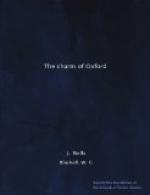The ecclesiastical position of Oxford is responsible also for the foundation of four of its colleges; both Lincoln and Brasenose, colleges that touch each other, were founded by Bishops of Lincoln; Foxe and Wolsey, too, though holding other sees later, ruled over the great midland diocese.
Richard Fleming, the Bishop of Lincoln, who founded the college that bears the name of his see, was in some ways a remarkable man. When resident in Oxford, he had been prominent among the followers of John Wycliffe and had shared his reforming views; but he was alarmed at the development of his master’s teaching in the hands of disciples, and set himself to oppose the movement which he had once favoured. He founded his “little college” with the express object of training “theologians” “to defend the mysteries of the sacred page against those ignorant laics, who profaned with swinish snouts its most holy pearls.” It is curious that Lincoln’s great title to fame—and it is a very great one—is that its most distinguished fellow was John Wesley, the Wycliffe of the eighteenth century.
The connection of Oxford and Lincoln College with Wesley and his movement is no accidental one, based merely on the fact that he resided there for a certain time. Humanly speaking, Wesley’s connection with Lincoln was a determining factor in his spiritual and mental development, and it was while he was there that his followers received the name of “Methodists,” a name given in scorn, but one which has become a thing of pride to millions. Wesley was a fellow of Lincoln for nine years, from 1726 to 1735. During the most impressionable years of a man’s life—he was only twenty-three when he was elected fellow—he was developing his mental powers by an elaborate course of studies, and his spiritual life by the careful use of every form of religious discipline which the Church prescribed. A college, with its daily services and its life apart from the world, rendered the practice of such discipline possible. It was because Wesley and his followers, his brother Charles, George Whitefield and others, observed this discipline so carefully that they obtained their nickname. It is with good reason that Lincoln Chapel is visited by his disciples from all parts of the world; it has been little altered since his time, his pulpit is still here, and the glass and the carving which make it very interesting, if not beautiful, are those which he saw daily.




